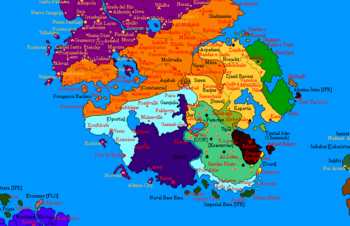Operation Butterworth

|
This article or section is a work in progress. The information below may be incomplete, outdated, or subject to change. |
| Operation Butterworth | |||||||
|---|---|---|---|---|---|---|---|
| Part of the Alexandrium Wars, the Bitter Spring | |||||||
 A map of southern Eura, the affected areas, at the start of Operation Butterworth; 1730 AN. |
|||||||
|
|||||||
| Belligerents | |||||||
| Supported by: | |||||||
| Commanders and leaders | |||||||
| Units involved | |||||||
| |||||||
| Strength | |||||||
Operation Butterworth is the Natopian military intervention in support of Oportia during the Alexandrium Wars and the regional turmoil known as the Bitter Spring. Initiated in IV.1730 AN, this operation was aimed at addressing the escalated military and humanitarian crises facing Oportia, notably underscored by the Naval Battle of Port Baroque and the complications surrounding Operation Secure Haven. In a significant demonstration of Raspur Pact solidarity and to assist Oportia's efforts in both territorial security and refugee crisis management, the Natopian Defense Force deployed 100,000 troops. Half of these forces were allocated to assist the Southeastern Eura Provisional Administration in establishing stability within the region, while the other half bolstered Operation Secure Haven's capabilities in handling the influx of refugees.
A crucial aspect of Operation Butterworth was the Natopian naval support during the Naval Battle of Port Baroque. The Natopian Defense Force's Raynor Fleet, comprising the 2nd Carrier Group, 3rd Home Group, and 1st Submarine Group, executed a timely and decisive counterattack against the Confederacy of the Dispossessed' Navy. This unexpected intervention decisively shifted the battle's outcome in favor of Oportia, dealing a significant blow to the Dispossessed Navy's operational capabilities.
Units Involved
Natopia
- Raynor Fleet
- 100,000 troops
Nouvelle Alexandrie
- Intelligence support
- Air Force support, logistical support, fuel/resupply support, fixing damage to ships from naval battle - from Norvind and Alduria City.
Confederacy of the Dispossessed
- Ships and units involved
Azad Eura
- Units involved in southeastern Eura
Timeline
- 5.IV.1730: With Oportia's Navy sustaining heavy damage and facing possible defeat, the unexpected arrival of the Natopian Defense Force's Raynor Fleet turns the tide. The 2nd Carrier Group, 3rd Home Group, and 1st Submarine Group launch a coordinated counterattack, delivering a crushing blow to the Dispossessed Navy.
- 7.IV.1730: The Naval Battle of Port Baroque reaches its climax as Natopian and Oportian forces continue their relentless assault, significantly depleting the Dispossessed Navy's capabilities. Despite their strategic victory, Oportia's Navy suffers heavy casualties and damage to its fleet, marking the victory as pyrrhic.
- 10.IV.1730:
- In the aftermath of the battle, both Oportia and the Confederacy of the Dispossessed assess the heavy toll the engagement has taken on their naval forces. The Oportian government publicly acknowledges the crucial role of the Natopian Defense Force in the battle's outcome, while grappling with the significant losses incurred. Recovery and repair efforts for the damaged vessels commence immediately, as the Oportian Navy prepares for the possibility of future confrontations.
- 11.IV.1730: Operation Butterworth commences as the Natopian Defense Force announces the deployment of 100,000 troops to assist Oportia:
- 50,000 are assigned to bolster the Southeastern Eura Provisional Administration's efforts to stabilize the region;
- Another 50,000 to support Operation Secure Haven in managing the migrant crisis.
- 14.IV.1730: The first contingent of Natopian troops, including military advisors, engineers, and necessary personnel, arrives in the Southeastern Eura Provisional Administration territory. Their mission encompasses not only reinforcing local security measures and repairing critical infrastructure but also providing humanitarian aid. Working in close collaboration with Oportian forces and NGOs, they also begin to impart vital training and support to bolster Oportia's capabilities in managing and mitigating the crises surrounding it.
- 16.IV.1730: Joint Oportian-Natopian patrols, now enhanced by the strategic insights and technological expertise of Natopian military advisors, commence along the border areas. This initiative is part of Operation Secure Haven's broader mandate, which includes securing the border to prevent unauthorized crossings and ensuring the safety and well-being of refugees within the temporary accommodation facilities. The arrival of Natopian engineers aids in the swift establishment of more robust and efficient infrastructure for these operations, ensuring a more effective response to the ongoing humanitarian and security challenges.
See also
- Operation Secure Haven
- Naval Battle of Port Baroque
- Southeastern Eura Provisional Administration
- Bitter Spring